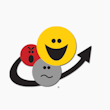About
Building Loyalty at B2B Companies
Building Loyalty at B2B Companies
NPS® correlates closely with greater market share, better employee engagement and higher profitability in B2B companies.
About
NPS® correlates closely with greater market share, better employee engagement and higher profitability in B2B companies.
B2B executives in industries ranging from industrial goods to financial services to healthcare find loyalty to be a powerful lever. But earning loyalty in B2B markets poses unique challenges, often involving complicated channel structures, concentrated buyer communities, or large accounts with many people influencing the relationship. Defining who the customers are and how to best engage them requires tailored solutions and a higher level of sophistication.
In B2B markets, even those long regarded as commodities, deriving strategic advantage from loyal customer relationships requires true differentiation. Often that means not just great products at competitive prices, but also dependable delivery, tailored services, and a high level of responsiveness and collaboration. The value in most B2B markets has shifted. Among manufacturers, for instance, profit pools have moved downstream to ancillary services, lifetime contracts, or provision by the hour—all of which depend on addressing customer needs such as reliability or reduced risk.
Despite the professed importance of customer relationships, it's getting tougher to maintain them: In a recent survey by Bain & Company of 290 executives in B2B industries throughout 11 countries, 68% of respondents said customers are less loyal than they used to be. To improve their businesses’ economics, B2B companies thus need to go beyond mere satisfaction to earn customers' enthusiasm and loyalty. Customer loyalty has a big upside on several fronts that combine to accelerate organic growth.
What does it take to delight a B2B customer? Most B2B customers evaluate providers on a combination of several criteria: Do they create economic and strategic value for our business? Do they simplify our daily operations (and my own work-life)? Can I trust them? Do I like working with them? An easy, trustworthy partnership in B2B markets can evoke personal feelings every bit as strong as with consumer products and brands.
B2B companies who are starting with Bain's Net Promoter System should aim to create a system that's highly tailored to the dynamics of the particular industry. B2B settings often involve several customer constituencies including gatekeepers, business leaders, and operational users. Each group has different needs and requires different types of interactions from providers. The design around when, how, and with whom to engage will depend on the provider's channel structure (intermediaries or not), the structure of decision making in the account (external influencers or not), and relevant episodes or moments of truth for the customer.
In construction, jet engines, or automotive supply, for example, loyalty depends largely on relationships and project results. A European paint supplier may have only 40 accounts, but each could be a huge automotive manufacturer with hundreds of decision-makers and influencers. In this case, most of the supplier's departments might interact with many individuals at the manufacturing firms they serve. For that reason, mapping its employees to customer contacts could become complex, and the NPS process would require thoughtful choices about whom to ask for feedback and how to communicate back when acting on customers' comments.
B2B companies that rely on intermediaries to interact directly with customers might consider evaluating ways to improve those relationships. And getting feedback from retailers and end-users, not just the intermediaries, can be quite valuable as well.
For an Indian steel company, the insights gleaned from such conversations formed the basis for a new product that is shaping up to be one of its most profitable. By collecting feedback from more than 1,000 end-users, retailers, and contractors, the company identified an opportunity to target certain farming segments with premium wire fencing. These discussions revealed that one customer segment prized durability because if a wire fence broke, the crops attached to it would fall and rot, while another segment valued the ease of installation so that fencing could be moved to accommodate different crops. This feedback led the company to design a new wire product that is thicker and has a more advanced protective coating for durability.
Insights gleaned from customer feedback will help a firm align investments with its customers' priorities, size the potential benefits and chart the best course to get there. Many Net Promoter® companies find that bringing the voice of the customer into decision making forces different departments—manufacturing, R&D, sales, marketing, and so on—to intensify their collaborations and introduce products that meet customers' needs.
A simple proposition—think like a customer—can transform performance in even the most complex B2B markets and lead to sustainable competitive advantage. But becoming customer-centered requires substantial changes in ways of working, behaviors, and mindsets: from an exclusive focus on product to a wider view that includes customers; from a single department's key performance indicators to an entire organization looking at one reliable metric; from rigid protocols to teams empowered to help customers. As more companies have discovered, an obsession with customer loyalty pays off with superior growth on the top and bottom lines.
We offer unparalleled analytic and organizational tools for the Net Promoter System. Together, we can create an enduring customer-centric culture.
Learn more Get in touch

